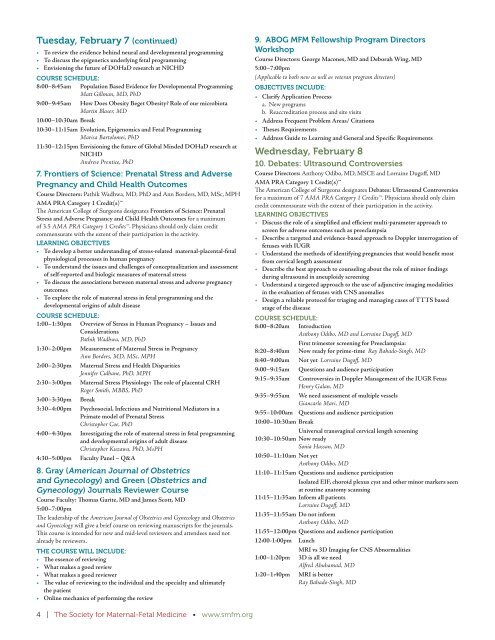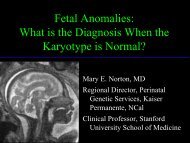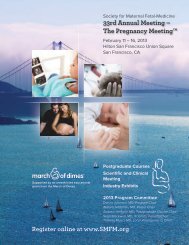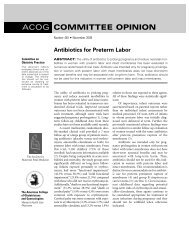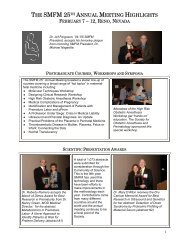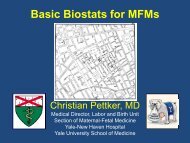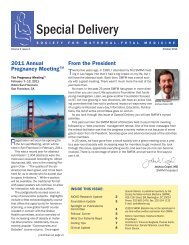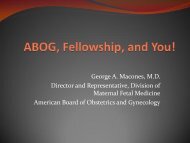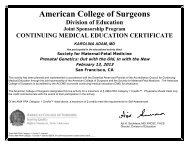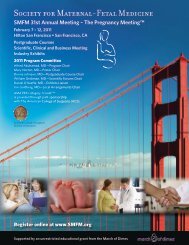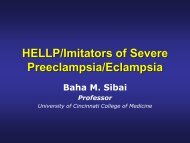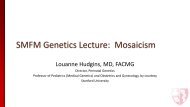Society for Maternal-Fetal Medicine
Society for Maternal-Fetal Medicine
Society for Maternal-Fetal Medicine
Create successful ePaper yourself
Turn your PDF publications into a flip-book with our unique Google optimized e-Paper software.
Tuesday, February 7 (continued)<br />
• To review the evidence behind neural and developmental programming<br />
• To discuss the epigenetics underlying fetal programming<br />
• Envisioning the future of DOHaD research at NICHD<br />
Course Schedule:<br />
8:00–8:45am Population Based Evidence <strong>for</strong> Developmental Programming<br />
Matt Gillman, MD, PhD<br />
9:00–9:45am How Does Obesity Beget Obesity? Role of our microbiota<br />
Martin Blaser, MD<br />
10:00–10:30am Break<br />
10:30–11:15am Evolution, Epigenomics and <strong>Fetal</strong> Programming<br />
Marisa Bartolomei, PhD<br />
11:30–12:15pm Envisioning the future of Global Minded DOHaD research at<br />
NICHD<br />
Andrew Prentice, PhD<br />
7. Frontiers of Science: Prenatal Stress and Adverse<br />
Pregnancy and Child Health Outcomes<br />
Course Directors: Pathik Wadhwa, MD, PhD and Ann Borders, MD, MSc, MPH<br />
AMA PRA Category 1 Credit(s)<br />
The American College of Surgeons designates Frontiers of Science: Prenatal<br />
Stress and Adverse Pregnancy and Child Health Outcomes <strong>for</strong> a maximum<br />
of 3.5 AMA PRA Category 1 Credits. Physicians should only claim credit<br />
commensurate with the extent of their participation in the activity.<br />
Learning Objectives<br />
• To develop a better understanding of stress-related maternal-placental-fetal<br />
physiological processes in human pregnancy<br />
• To understand the issues and challenges of conceptualization and assessment<br />
of self-reported and biologic measures of maternal stress<br />
• To discuss the associations between maternal stress and adverse pregnancy<br />
outcomes<br />
• To explore the role of maternal stress in fetal programming and the<br />
developmental origins of adult disease<br />
Course Schedule:<br />
1:00–1:30pm Overview of Stress in Human Pregnancy – Issues and<br />
Considerations<br />
Pathik Wadhwa, MD, PhD<br />
1:30–2:00pm Measurement of <strong>Maternal</strong> Stress in Pregnancy<br />
Ann Borders, MD, MSc, MPH<br />
2:00–2:30pm <strong>Maternal</strong> Stress and Health Disparities<br />
Jennifer Culhane, PhD, MPH<br />
2:30–3:00pm <strong>Maternal</strong> Stress Physiology: The role of placental CRH<br />
Roger Smith, MBBS, PhD<br />
3:00–3:30pm Break<br />
3:30–4:00pm Psychosocial, Infectious and Nutritional Mediators in a<br />
Primate model of Prenatal Stress<br />
Christopher Coe, PhD<br />
4:00–4:30pm Investigating the role of maternal stress in fetal programming<br />
and developmental origins of adult disease<br />
Christopher Kuzawa, PhD, MsPH<br />
4:30–5:00pm Faculty Panel – Q&A<br />
8. Gray (American Journal of Obstetrics<br />
and Gynecology) and Green (Obstetrics and<br />
Gynecology) Journals Reviewer Course<br />
Course Faculty: Thomas Garite, MD and James Scott, MD<br />
5:00–7:00pm<br />
The leadership of the American Journal of Obstetrics and Gynecology and Obstetrics<br />
and Gynecology will give a brief course on reviewing manuscripts <strong>for</strong> the journals.<br />
This course is intended <strong>for</strong> new and mid-level reviewers and attendees need not<br />
already be reviewers.<br />
The course will include:<br />
• The essence of reviewing<br />
• What makes a good review<br />
• What makes a good reviewer<br />
• The value of reviewing to the individual and the specialty and ultimately<br />
the patient<br />
• Online mechanics of per<strong>for</strong>ming the review<br />
9. ABOG MFM Fellowship Program Directors<br />
Workshop<br />
Course Directors: George Macones, MD and Deborah Wing, MD<br />
5:00–7:00pm<br />
(Applicable to both new as well as veteran program directors)<br />
Objectives include:<br />
• Clarify Application Process<br />
a. New programs<br />
b. Reaccreditation process and site visits<br />
• Address Frequent Problem Areas/ Citations<br />
• Theses Requirements<br />
• Address Guide to Learning and General and Specific Requirements<br />
Wednesday, February 8<br />
10. Debates: Ultrasound Controversies<br />
Course Directors: Anthony Odibo, MD, MSCE and Lorraine Dugoff, MD<br />
AMA PRA Category 1 Credit(s)<br />
The American College of Surgeons designates Debates: Ultrasound Controversies<br />
<strong>for</strong> a maximum of 7 AMA PRA Category 1 Credits. Physicians should only claim<br />
credit commensurate with the extent of their participation in the activity.<br />
Learning Objectives<br />
• Discuss the role of a simplified and efficient multi-parameter approach to<br />
screen <strong>for</strong> adverse outcomes such as preeclampsia<br />
• Describe a targeted and evidence-based approach to Doppler interrogation of<br />
fetuses with IUGR<br />
• Understand the methods of identifying pregnancies that would benefit most<br />
from cervical length assessment<br />
• Describe the best approach to counseling about the role of minor findings<br />
during ultrasound in aneuploidy screening<br />
• Understand a targeted approach to the use of adjunctive imaging modalities<br />
in the evaluation of fetuses with CNS anomalies<br />
• Design a reliable protocol <strong>for</strong> triaging and managing cases of TTTS based<br />
stage of the disease<br />
Course Schedule:<br />
8:00–8:20am Introduction<br />
Anthony Odibo, MD and Lorraine Dugoff, MD<br />
First trimester screening <strong>for</strong> Preeclampsia:<br />
8:20–8:40am Now ready <strong>for</strong> prime-time Ray Bahado-Singh, MD<br />
8:40–9:00am Not yet Lorraine Dugoff, MD<br />
9:00–9:15am Questions and audience participation<br />
9:15–9:35am Controversies in Doppler Management of the IUGR Fetus<br />
Henry Galan, MD<br />
9:35–9:55am We need assessment of multiple vessels<br />
Giancarlo Mari, MD<br />
9:55–10:00am Questions and audience participation<br />
10:00–10:30am Break<br />
Universal transvaginal cervical length screening<br />
10:30–10:50am Now ready<br />
Sonia Hassan, MD<br />
10:50–11:10am Not yet<br />
Anthony Odibo, MD<br />
11:10–11:15am Questions and audience participation<br />
Isolated EIF, choroid plexus cyst and other minor markers seen<br />
at routine anatomy scanning<br />
11:15–11:35am In<strong>for</strong>m all patients<br />
Lorraine Dugoff, MD<br />
11:35–11:55am Do not in<strong>for</strong>m<br />
Anthony Odibo, MD<br />
11:55–12:00pm Questions and audience participation<br />
12:00-1:00pm Lunch<br />
MRI vs 3D Imaging <strong>for</strong> CNS Abnormalities<br />
1:00–1:20pm 3D is all we need<br />
Alfred Abuhamad, MD<br />
1:20–1:40pm MRI is better<br />
Ray Bahado-Singh, MD<br />
4 | The <strong>Society</strong> <strong>for</strong> <strong>Maternal</strong>-<strong>Fetal</strong> <strong>Medicine</strong> • www.smfm.org


